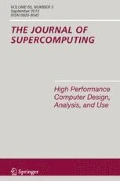Abstract
Evolutionary algorithms are an alternative option to the Boolean synthesis due to that they allow one to create hardware structures that would not be able to be obtained with other techniques. This paper shows a parallel genetic programming (PGP) Boolean synthesis implementation based on a cluster of FPGAs that takes full advantage of parallel programming and hardware/software co-design techniques. The performance of our cluster of FPGAs implementation has been compared with an HPC implementation. The experimental results have shown an excellent behavior in terms of speed up (up to ×500) and in terms of solving the scalability problems of this algorithms present in previous works.
Similar content being viewed by others
References
Aguirre A, Coello C, Buckles B (1999) A genetic programming approach to logic function synthesis by means of multiplexers. In: Proc of the I NASA/DoD workshop on evolvable hardware, 1999, pp 46–53
Cantú-Paz E (2001) Migration policies, selection pressure, and parallel evolutionary algorithms. J Heuristics 7(4):311–334
Coello CAC, Zavala RL, García BM (2000) Ant colony system for the design of combinational logic circuits. In: Lecture notes in computer science. Springer, Berlin, pp 21–30
Higuchi T, Niwa T, Tanaka T, Iba H, de Garis H (1993) Evolving hardware with genetic learning: a first step towards building a Darwin machine. In: Proc of the second int conf on from animals to animats, Jan 1993, pp 417–424
Kajitani I, Hoshino T, Iwata M, Higuchi T (1996) Variable length chromosome ga for evolvable hardware. Evol Comput (Jan):443–447
Koza J, Bennett F, Andre D, Keane M (1999) Genetic programming iii: Darwinian invention and problem solving. Evol Comput (Jan):pp 451–453
Koza JR, Keane MA, Streeter MJ, Mydlowec W, Yu J (2005) Genetic programming iv: Routine human-competitive machine intelligence. Kluwer Academic, Dordrecht
Krohling R, Zhou Y, Tyrrell A (2002) Evolving FPGA-based robot controllers using an evolutionary algorithm. In Proc I int conf artificial immune systems, Jan 2002, pp 41–46
Moreno JM, Thoma Y, Sanchez E (2005) Poetic: a prototyping platform for bio-inspired hardware. In: ICES, 2005, pp 177–187
Nicholson A (2000) Evolution and learning for digital circuit design. In: Proc genetic and evolutionary computation conf, 2000, pp 519–524
Pedraza C, Castillo E, Castillo J, Camarero C, Bosque J, Martínez J (2008) Cluster architecture based on low cost reconfigurable hardware. In: Proc 18 FPL conf, Jan 2008, pp 595–598
Rothlauf F (2006) Representations for genetic and evolutionary algorithms. Springer, Berlin
Steiner N, Athanas P (2007) Autonomous computing systems: a proposed roadmap. In: ERSA, 2007, pp 220–226
Upegui A, Sanchez E (2005) Evolving hardware by dynamically reconfiguring Xilinx FPGAs. In: ICES, 2005, pp 56–65
Upegui A, Sanchez E (2006) Evolving hardware with self-reconfigurable connectivity in Xilinx FPGAs. In: AHS, 2006, pp 153–162
Vasícek Z, Sekanina L (2008) Hardware accelerators for Cartesian genetic programming. In: Lecture notes in computer science. Springer, Berlin, pp 230–241
Xu H, Ding Y, Hu Z (2009) Adaptive immune genetic algorithm for logic circuit design. In: Proc of the first ACM/SIGEVO, 2009, pp 639–644
Yu Q, Chen C, Pan C (2006) Parallel genetic algorithms on programmable graphics hardware. In: Lecture notes in computer science. Springer, Berlin, pp 1051–1059
Author information
Authors and Affiliations
Corresponding author
Rights and permissions
About this article
Cite this article
Pedraza, C., Castillo, J., Martínez, J.I. et al. Genetic Algorithm for Boolean minimization in an FPGA cluster. J Supercomput 58, 244–252 (2011). https://doi.org/10.1007/s11227-010-0401-7
Published:
Issue Date:
DOI: https://doi.org/10.1007/s11227-010-0401-7




